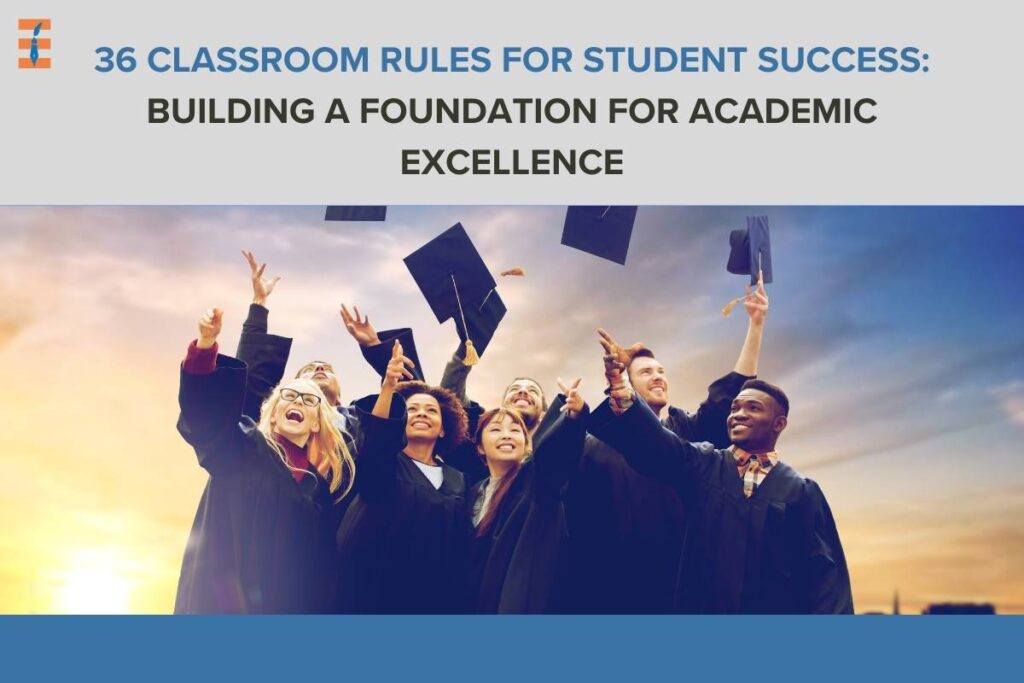Creating a conducive learning environment is crucial for student success. Classroom rules play a pivotal role in shaping the educational experience, fostering a positive atmosphere, and promoting academic achievement. In this article, we will explore 36 essential classroom rules that educators can implement to enhance student success.
Here are the 36 essential classroom rules for student success:
1. Be Respectful
Respect is the cornerstone of any successful classroom. Students should treat their peers, teachers, and other staff members with kindness and courtesy.
2. Listen Attentively
Active listening is a skill that leads to better understanding. Encourage students to listen attentively during lectures, discussions, and group activities.
3. Come Prepared
Preparation is key to student success. Students should arrive in class with all necessary materials, completed assignments, and a willingness to engage in the learning process.
4. Follow Instructions
Clear communication is vital. Students should follow instructions carefully to ensure they grasp the concepts being taught and complete assignments accurately.
5. Participate Actively
Active participation fosters a dynamic learning environment. Encourage students to contribute to discussions, ask questions, and engage with the subject matter.
6. Be Punctual
Punctuality is a life skill. Students should arrive on time for class to maximize learning opportunities and demonstrate responsibility.
7. Use Technology Wisely

In the digital age, technology is a valuable tool. Establish guidelines for responsible and purposeful technology use in the classroom.
8. Respect Personal Space
Teach students to respect each other’s personal space, both physically and emotionally, to create a comfortable and safe learning environment.
9. Embrace Diversity
Promote a culture of inclusivity by celebrating and respecting differences. Foster an environment where students appreciate diverse perspectives and lead to student success.
10. Be Open to Feedback
Constructive feedback is essential for growth. Encourage students to accept feedback graciously and use it as a tool for improvement.
11. Foster a Growth Mindset
Instill the belief that intelligence and abilities can be developed through dedication and hard work. A growth mindset contributes to resilience and a love for learning.
12. Practice Good Hygiene
A clean and hygienic classroom is conducive to learning. Encourage students to maintain good personal hygiene and keep their workspace tidy.
13. Be Responsible for Your Actions
Accountability is a valuable life skill. Students should take responsibility for their actions, whether it’s completing assignments on time or addressing conflicts appropriately.
14. Stay Positive
A positive attitude contributes to a healthy learning environment. Encourage students to approach challenges with optimism and resilience.
15. Seek Help When Needed
It’s okay to ask for help. Encourage students to seek assistance from teachers or peers when they face challenges in understanding the material.
16. Be Mindful of Noise Levels
Establish guidelines for appropriate noise levels to create a focused and productive classroom atmosphere.
17. Encourage Collaboration
Collaborative learning enhances student engagement. Promote teamwork and cooperation through group projects and activities.
18. Use Kind Words
Language matters. Encourage students to use kind and respectful words when communicating with their peers and teachers.
19. Stay Focused
Maintain a focused mindset during class to optimize learning opportunities. Minimize distractions and prioritize academic engagement.
20. Value Time
Teach students the importance of time management. Help them understand the value of allocating time wisely for various tasks.
21. Set Academic Goals
Goal-setting is a powerful motivator. Encourage students to set realistic academic goals and work towards achieving them.
22. Be Inquisitive
Foster a sense of curiosity. Encourage students to ask questions, seek deeper understanding, and explore topics beyond the surface level making a way to student success.
23. Develop Strong Study Habits

Guide students in cultivating effective study habits, including time management, note-taking, and reviewing material regularly.
24. Be Mindful of Personal Belongings
Respect for personal property is crucial. Teach students to be mindful of their belongings and the property of others.
25. Celebrate Achievements
Acknowledge and celebrate both big and small achievements. Positive reinforcement enhances motivation and self-esteem.
26. Encourage Critical Thinking
Promote critical thinking skills by challenging students to analyze information, evaluate evidence, and draw informed conclusions.
27. Practice Empathy
Empathy fosters a supportive community. Encourage students to understand and empathize with the perspectives and feelings of others.
28. Emphasize the Importance of Attendance
Regular attendance is essential for academic student success. Stress the importance of attending classes consistently and punctually.
29. Use Class Time Effectively
Maximize the use of class time for learning. Minimize disruptions and ensure that instructional time is utilized efficiently.
30. Embrace a Positive Classroom Culture
Create a positive and inclusive classroom culture where students feel valued, supported, and inspired to learn.
31. Foster a Love for Reading
Encourage a love for reading by providing a diverse selection of engaging and relevant literature. Reading expands knowledge and enhances literacy skills.
32. Address Bullying Promptly
Zero tolerance for bullying is essential. Create an environment where students feel safe and confident in reporting incidents of bullying.
33. Instill a Strong Work Ethic

Emphasize the importance of hard work and perseverance. A strong work ethic is a key factor in achieving academic student success.
34. Provide Clear Grading Criteria
Transparency in grading criteria helps students understand expectations and work towards meeting them. Clear communication enhances academic success.
35. Encourage Extracurricular Involvement
Extracurricular activities contribute to well-rounded development. Encourage students to participate in clubs, sports, and other extracurricular opportunities.
36. Reflect on Personal Growth
Encourage students to reflect on their personal and academic growth. Regular self-reflection promotes self-awareness and continuous improvement.
Conclusion
Implementing these 36 classroom rules can create a positive and conducive learning environment that nurtures student success. By fostering respect, responsibility, and a love for learning, educators contribute significantly to the holistic development of their students. A well-managed classroom sets the stage for academic excellence and prepares students for future challenges and opportunities.

How Tone of Voice Shapes Your Classroom Culture
If words are swords piercing the heart then the “Tone of voice” is the hand holding that sword. In the education industry, effective communication is the cornerstone of building a positive and conducive classroom culture.

